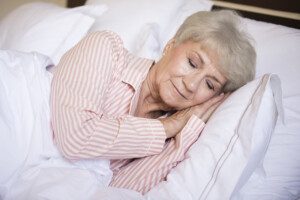
You don’t get a pass on the dangers of excessive sleep & napping just because you’re elderly.
Some older people will make excuses for all of their naps and will insist they “need it,” but being elderly does not make one immune to the hazards of excessive inertia.
First of all, there are medical conditions that cause excessive drowsiness and a desire to nap a lot, such as:
- Sleep apnea (untreated)
- Hypothyroidism (untreated)
- Side effects of some medications
- Medical conditions that interfere with overnight sleep, making an elderly person sleepy during the day and wanting to take long naps.
This article is about elderly people who seem healthy and are quite functional, but they take lengthy naps daily, sometimes twice a day – after sleeping overnight for at least eight hours, sometimes 10 hours.
These particular elderly people have the following traits:
- May or may not be diagnosed with multiple conditions that do not cause excessive daytime sleepiness such as heart disease or heart failure (causes fatigue, not sleepiness), low kidney function, arthritis and spinal stenosis.
- Are mentally alert, no sign of cognitive impairment, function well in day-to-day activities, even still drive.
- May get around without the use of a cane.
- Or, may need a cane or walker.
- Use their elderly status as an excuse for excessive napping, even though they’ve been napping excessively for years. However, retirement has given them more time to nap.
- Tend to nap whenever sitting in a particular chair, namely, a very comfortable recliner. The sudden “need” for sleep just happens to occur whenever they’re in that recliner and the TV is on, even though when they initially got in, they were wide awake.
- Boredom is a common precursor to napping. In fact, on particularly busy days (e.g., relatives visiting), the elderly person magically has no need for any napping.
- Uses back or knee pain as an excuse for a two- or even three-hour nap, even though family members have insisted that sitting upright and being alert and productive will “rest” the painful back or knee just as much.
- The elderly individual does not show signs of depression.
- Their doctor does not think they have sleep apnea, and blood tests are normal for endocrine disorders.
- Deny having been asleep for two hours in the middle of the day, stating things like, “I was awake but I was just resting my eyes,” or, “I wasn’t really asleep; I was thinking.”
As for that last point, the evidence of sound sleep during the nap is snoring, a mouth that’s hanging wide open, and/or not responding to sudden loud noises (e.g., glass falling on floor), the doorbell, phone, and of course, calling their name several times is necessary to arouse them.
We also have to be sure to differentiate between napping in a recliner (falling asleep) due to drowsiness or induced drowsiness from TRYING to fall asleep due to boredom …. and lying immobile in the recliner, wide awake, but with whole-body fatigue from a medical condition or age related lethargy.
Dangers of Excessive Sleep: Don’t They Apply to the Elderly?
We keep hearing about study after study showing the dangers of excessive sleep. These studies typically refer to excessive sleep as that which occurs overnight.
For example, a study by Liu et al in the journal SLEEP says that sleeping over 10 hours is linked to heart disease in people over 45.
A study in PLOS Medicine (Ding et al) says that sleeping more than nine hours, especially in people who engage in excessive daytime sitting, increases premature death risk.
The hazards of excessive sleep per 24 hour cycle do not exempt the elderly.
Excessive sleep is strongly tied to a greater risk for congestive heart failure, heart disease, death by heart disease, diabetes and deep vein thrombosis.
Are there any solutions?
For the type of elderly person described above, who’s still cognitively intact and highly functional, a pursuit of a new hobby will discourage excessive napping.
A person can watch only so much TV, peruse so much online news and read so much Kindle before getting really bored if there’s no other stimulation.
Mobility impairments, back and/or knee pain do indeed encourage wanting to spend excessive time in one’s favorite recliner, which then in turn can easily induce enough sleepiness to fall into deep slumber.
“Sleepiness that occurs abruptly in the elderly needs to be investigated,” says Kathryn Boling, MD, a board certified family medicine practitioner with Mercy Medical Center in Baltimore, MD.
“Changes in mental alertness like excessive drowsiness can be a sign of infection,” continues Dr. Boling.
“In fact, urinary tract infection in the elderly typically manifests as an abrupt change in mental alertness.
“Increased sleeping that occurs subtly over time, especially in the very elderly – over age 80 years — or is accompanied by memory changes associated with aging and/or Alzheimer’s, may be normal.”
But the dangerous conditions that excessive inertia cause do not care if the person is over age 65.
The harm of all that inertia applies just as much to the elderly as it does to middle agers.

Dr. Boling diagnoses and treats a wide range of conditions from acute illnesses to chronic diseases such as diabetes and hypertension, and has 20 years’ experience with Mercy Medical Center-Baltimore.
 Lorra Garrick has been covering medical, fitness and cybersecurity topics for many years, having written thousands of articles for print magazines and websites, including as a ghostwriter. She’s also a former ACE-certified personal trainer.
Lorra Garrick has been covering medical, fitness and cybersecurity topics for many years, having written thousands of articles for print magazines and websites, including as a ghostwriter. She’s also a former ACE-certified personal trainer.
.
























